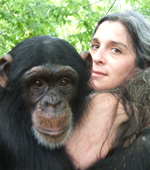Gruen Recognized for Work with Captive Chimpanzees

Lori Gruen, associate professor of Feminist, Gender and Sexuality Studies Program, associate professor of philosophy, was recently awarded the William A. Robinson Visionary Award for 2007-2008 for her work with captive chimpanzees at Chimp Haven in Keithville, La. Gruen has donated her time and provided her expertise in ethics to the organization for the past three years.
The chimpanzees that arrive at Chimp Haven have spent time as either research subjects, performers or pets. Although the chimps are primarily from laboratories, when Gruen was last there she observed a recently rescued chimp named named Henry who had been kept as pet.
“He was kept in horrible conditions and was very close to death.”
Henry is now one of over 100 chimpanzees kept safe and healthy at the 200-acre Chimp Haven sanctuary. The facility is located in the Eddie D. Jones Nature Park, 22 miles southwest of Shreveport, La. The chimpanzees receive expert medical care, which is especially needed for those who arrive at the sanctuary with the HIV virus, Hepatitis and other diseases.
As administrators work on convincing outsiders that it’s less expensive to keep chimpanzees at Chimp Haven than to keep them in labs, Gruen assists by providing ethical arguments for the protection of chimps. She’s also in demand as a speaker and has recently been doing presentations on ethical issues, policies and laws regarding chimpanzees in research laboratories thorough the country.
“What’s very unique about Chimp Haven is that they bring together all aspects of the world of chimpanzee interests,” Gruen says. “They’re supported by pharmaceutical companies, by the National Institutes of Health, by laboratories, by zoos, by animal protection organizations, and by scholars.”
According to Chimp Haven’s website, “the philosophy of the Board is that cooperation among a diverse group of individuals will only strengthen their resolve to provide permanent homes for retired chimpanzees.”
“[Chimp Haven] believes that ‘Everyone is contributing in some way to the vision of chimpanzees in retirement.’ I just felt honored to be one of the people who has been supporting that effort,” she says.
Gruen is not only working on ethical considerations for activist, regulatory and legislative documents, she’s studying the ethics of animal protection as a scholar, and is working on a book about human relations to chimpanzees.
The questions that compelled Gruen to write her book are brought up by her research. She has been trying to discern whether chimpanzees “are capable of engaging in ethical or proto-ethical behavior.” She is also concerned with how humans and chimpanzees interact.
“I study the way our engagement with others and the recognition of their difference from us, but also our recognition of obligations to and our responsibilities for them helps us to develop ethical skills,” Gruen says. “One of the things that I think is very interesting in working with chimpanzees is that they look at us, they look into our eyes. Even though they are so different than we are, they call us to respond to them. Being able to respond across vast species differences, I think is a very important ethical skill.”
Gruen is also concerned with the protection of chimpanzees and giving them the best captive care available. She works to educate others about the plight of chimpanzees in laboratories.
“What’s exciting is that interestingly there’s a lot of public support for protecting chimpanzees,” she says. “I think there’s a growing awareness of what chimpanzees are like.”
Gruen has long known what others are just starting to learn: chimpanzees, while very intelligent animals, are not to be domesticated. They are strong wild animals who belong with others of their own kind.
“Extending ethical consideration to chimpanzees is one manifestation of increasing concerns for other forms of life and an increased sense of human responsibility and stewardship for other animals and the planet,” Gruen says.
To learn more about Chimp Haven, go here.

